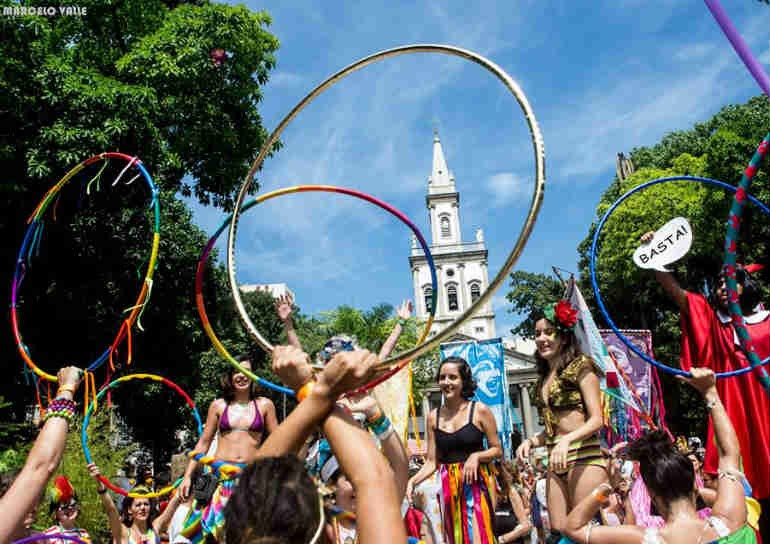Yasmin Curzi, Rio de Janeiro, Brazil, SSH Blog Correspondent

“Street carnival” in Brazil can be defined as an open encounter for all kinds of people in public spaces, such as streets, corners and squares, across hours (or days).
Each neighborhood has its favorite blocks, blocos, and during Carnival in early February, there will be nearly 500. It’s the only moment during the whole year when people actually stand in these spaces; during the rest of the year they only serve as transitory spots.
The fact that people can remain in the city in order to celebrate life, dancing, drinking, flirting, wearing costumes (many of them with political themes) contrasts with a certain vision of a “blasé” city, that serves only to reproduce capitalism. Street Carnival, therefore, is a political manifesto by itself.
Carnival brings a general feeling of freedom – and that is a beautiful thing. But too much freedom, with our cultural issues such as misogyny, can lead to an increase in harassment and sexual violence cases. Men can turn really aggressive in their approach toward women and it’s almost impossible, as a woman, to go anywhere alone without being vulnerable to these aggressions. Thus, in order to try to stay safe, women worry about their behavior, what they should or should not wear, what amount of alcohol to ingest, and how they’ll get to and from places. Of course, these are all the things that most of us women worry about everyday in order to avoid sexual violence (a study by Think Olga showed that of almost 8,000 respondents in Brazil, 98 percent of them had faced street harassment) – but during Carnival, we pay even more attention. In contrast, men are free to do anything they want in the blocks, with their only fear perhaps being pickpockets.
Despite these situations, Carnival in Rio is one of the most wonderful spectacles we have. The city is always colorful and there’s an inexplicable magic in the air that everyone can feel. Its energy reaches even the grumpiest person. Carnival itself is not a problem; the violence that occurs during it is the problem that we want to eradicate. But we can’t do that without a profound cultural change. Therefore, feminists are organizing campaigns, safe spaces and blocks to enable equity in Carnival.
In Rio, the journalist and activist Renata Rodrigues started a “safe space” samba street block named “Mulheres Rodadas” (Women Who Get Around). The name was in response to a viral post of a man with a sexist sign reading, “I don’t want a woman who gets around.” This feminist Carnival block “Women Who Get Around” attracted thousands of followers and supplied much more than street samba. It built a whole network of support to battered women who can learn how to play instruments. It serves as a support group. Also, they promoted an awareness-raising campaign for a harassment-free Carnival with the hashtag “#CarnavalSemAssedio” (#CarnivalWithoutHarassment).

Last Carnival there was also a campaign called “Minas de Vermelho” (“Girls in Red”). Women wear red lace on their arm to symbolize solidarity with other women, so if one girl or woman suffers or is afraid of suffering an aggression, she can search for women wearing these laces to find safety.
These are examples of how feminists are tackling sexism in Carnival and transforming it from being more than just a party, but a disruptive demonstration. This is one hell of a way to advocate for women’s right to the city and produce cultural changes.
Yasmin is a Research Assistant at the Center for Research on Law and Economics at FGV-Rio. She has a Master’s Degree in Social Sciences from PUC-Rio where she wrote her thesis on street harassment and feminists’ struggles for recognition.
